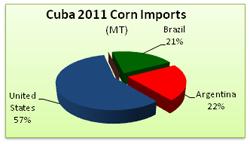By Kurt Shultz, USGC Regional Director in Latin America & the Carribbean
Cubans paid almost 20 percent more for food last year as economic reforms, reduced imports and stagnating farm production touched off price inflation according to a Reuters news report. Additionally, Cuba’s National Office of Statistics recently published a report claiming meat prices rose 8.7 percent and produce prices were up 24.1 percent for an average of 19.8 percent.
Agricultural reform and increased food production is a top priority for President Raúl Castro since taking over for ailing brother Fidel Castro in 2008. But agricultural output increased only 2 percent last year, after falling 2.5 percent in 2010. At the same time, Raúl has had to cut food imports to reduce spending by a debt-ridden government. Yet because of low farm output, Cuba is importing a budget-busting 60 to 70 percent of the food it consumes. In 2011, Cuba imported 700,000 metric tons (27.6 million bushels) of corn and 110,000 tons of distiller’s dried grains with solubles (DDGS) from the United States.
Traditionally importing the majority of their needs from the United States, Cuba is buying more corn from Brazil or Argentina due to a U.S. trade policy requiring Cuba to make cash payments for their purchases. Although the United States still maintains over 50 percent of the market, Cuba is also prohibited from using credit to make purchases, and this “cash-strapped” government is looking to U.S. competitors in the South for their feed grain needs.



